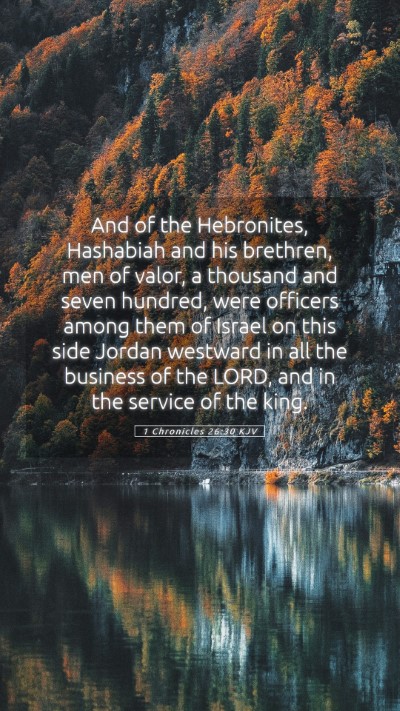Understanding 1 Chronicles 26:30
1 Chronicles 26:30 states: "And of the Hebronites, Jerijah was the chief; even of the Hebronites, according to their generations, by their families." This verse highlights the role of the Hebronites in the Levitical order during the time of King David.
Bible Verse Meanings and Insights
This verse provides insight into the organization of the Levitical families, focusing specifically on the Hebronites and their significance in the priestly duties.
Commentary Insights
-
Matthew Henry's Commentary:
Henry points out the importance of order and leadership within the tribes of Israel. He emphasizes that Jerijah, as the chief of the Hebronites, represents a significant role in maintaining spiritual responsibilities and duties among his people. The mention of "according to their generations" indicates the emphasis on lineage and inheritance in fulfilling divine roles.
-
Albert Barnes' Notes:
Barnes highlights the historical context of the Hebronites, noting their origins as a prominent family within the Kohathite clan of the Levites. This identification is crucial for understanding how the tribe was structured and how they functioned within the tabernacle and later the temple. Barnes also remarks on the continuity of leadership roles through generations, underscoring the respect for lineage in the Israelite culture.
-
Adam Clarke's Commentary:
Clarke elaborates on the importance of the Hebronites, stating that their location in Hebron linked them to King David, who reigned there before moving to Jerusalem. This geographical mention reflects on their loyalty and connection to David's kingship. Clarke also notes the aspiration of the leaders to fulfill their duties faithfully, setting an example of dedication and servitude to God.
Bible Verse Interpretations
The verse can be interpreted as a witness to both the structure and governance of the Israelites during a pivotal time in their history. This reflects not just on the role of the Hebronites but also serves as a model for understanding leadership in spiritual contexts today.
Key Themes and Applications
- Leadership: The significance of having a chief or leader, such as Jerijah, reflects the necessity of organized leadership in both spiritual and community settings.
- Heritage: Understanding one's lineage and traditions is essential in preserving spiritual practices and teachings, as demonstrated by the generations of Hebronites.
- Service: The commitment to serve God and the community represents the foundational ethos of Jewish tradition and Christian practices alike.
Related Bible Cross References
- Numbers 3:27-32 - Details the roles of the Levites and their duties.
- 2 Samuel 23:19 - Discusses the honored warriors of David, providing context to the leaders of David's time.
- 1 Chronicles 12:23 - Reflects on the tribes that joined David at Hebron, highlighting their support and legitimacy.
Conclusion
1 Chronicles 26:30 gives readers valuable insights into the importance of leadership and heritage within the church and community. Through historical context, structured commentary, and analysis of themes, this verse illustrates how the principles of organization, service, and respect for lineage remain relevant in contemporary church practice.
Bible Study Insights and Tools
For those interested in deeper Bible study insights, this verse can be an excellent starting point in discussing the role of leadership in spiritual communities. Utilizing tools such as Bible study guides and online Bible study resources can enhance understanding and provide clarity on how these ancient texts apply to modern life.


